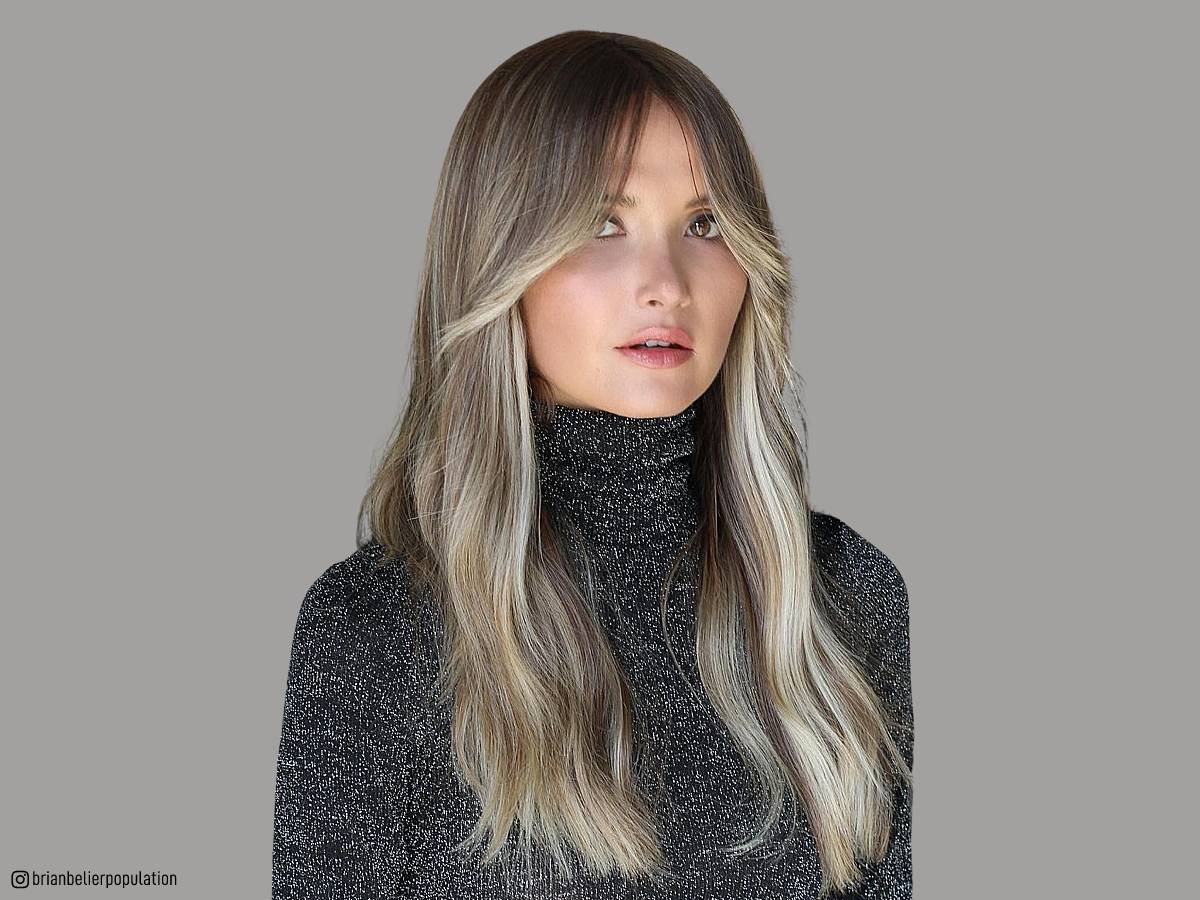Popular Long Hair Questions, Answered by Experienced Hairstylists

Have long hair? Find trustworthy answers to the most popular questions women have about longer hair. Each question is answered by a knowledgeable hairstylist with years of experience. If you have a long hair question that you don’t see an answer for, contact us!
Jump to Answer
- Does long hair age you?
- What size curling iron is best for long hair?
- What is the best curling iron for long hair?
- Can you perm long hair?
- Can barbers cut long hair?
- Can long hair cause hair loss?
- Can you cut long hair with clippers?
- What is the best shampoo for long hair?
- When is it best to trim long hair?
- How often should I wash long hair?
- When is hair considered long?
- How can I best grow out long hair when it’s thick?
- Does long hair shed more?
- Does long hair make you hotter?
- Does long hair get greasy faster?
- Why trim long hair?
- If I want to grow my hair out long, should I still cut it?
- How can I decide between short and long hair?
- Which hair type is best for long hair?
- Is long hair OK after 50?
- Is having long hair healthy?
- What are the disadvantages of long hair?
- How can I best grow long hair without split ends?
- Should you braid long hair at night?
- What are some good tips for growing out long, healthy hair?
- How much shampoo should I use for long hair?
- How often should you trim long hair?
Does long hair age you?
Long hair can definitely age a woman – but it ultimately depends on how you style it! Uber long, pin-straight tresses tend to make us look older, as lack of volume and style is associated with aging hair. If you’re worried about looking older but still desire long locks, there are a few adjustments you can make! At your next appointment, ask your stylist to add more face-framing, choppier layers, or a fresh fringe.
 Answered by Ashley Mishler, hairstylist from Chicago, Illinois
Answered by Ashley Mishler, hairstylist from Chicago, Illinois
What size curling iron is best for long hair?
When it comes to curling irons for long hair, there are a lot of options. To avoid confusion, stop and ask yourself “how tight or loose do I want my curls?” For example, if you’re going for more of a “fresh blowout” look, grab a 1.5 inch “big barrel” curling iron and wrap large sections. If you desire a smaller spiral or “mermaid wave,” 1-inch curling iron or wand would be best. A basic rule to remember is the smaller the iron, the tighter the curl.
 Answered by Ashley Mishler, hairstylist from Chicago, Illinois
Answered by Ashley Mishler, hairstylist from Chicago, Illinois
What is the best curling iron for long hair?
Overall, the best curling iron for long hair is the “T3 Convertible Curling Iron.” The T3 has 5 temperature settings and a ceramic barrel, which allows for even heat distribution to help protect your hair. The best part? The T3 comes with five interchangeable barrels so you can achieve any curl and style you desire!
 Answered by Ashley Mishler, hairstylist from Chicago, Illinois
Answered by Ashley Mishler, hairstylist from Chicago, Illinois
Can you perm long hair?
Yes, long hair can be permed! However, there are a couple of things to remember before making that appointment. First, you want to talk to your stylist about your color history – past and current. There are all kinds of perms on the market and only certain types can be used on colored hair. Second, be sure to have an in-depth consultation with your stylist about your desired look. Make sure to discuss perm rod size, type, and the “wrapping technique” so that you end up with the appropriate curl pattern.
 Answered by Ashley Mishler, hairstylist from Chicago, Illinois
Answered by Ashley Mishler, hairstylist from Chicago, Illinois
Can barbers cut long hair?
Technically, barbers can cut long hair, but it’s not their specialty. Most barbers only cut long hair when they are removing it to create a shorter, more traditional style. Those with long hair will find that a stylist at a salon can better meet their needs.
 Answered by Ashley Mishler, hairstylist from Chicago, Illinois
Answered by Ashley Mishler, hairstylist from Chicago, Illinois
Can long hair cause hair loss?
Long hair does not cause hair loss. If you’re noticing an increase in shedding or shorter hairs around your hairline, don’t worry! Longer lengths are almost always accompanied by shedding. Amounts can change based on the season, your washing regiment, and how you wear your hair. Also, if you’re constantly wearing your hair pulled back, you might be experiencing breakage around your hairline and at your crown. Instead, try switching to loose braids or wear your hair down as often as possible.
 Answered by Ashley Mishler, hairstylist from Chicago, Illinois
Answered by Ashley Mishler, hairstylist from Chicago, Illinois
Can you cut long hair with clippers?
Long hair should not be cut with clippers. Can it be? Sure! But should you? No. Clippers create very blunt, uniform lines typically not suited for longer lengths. Additionally, the techniques and angles used to cut long hair don’t mix with clippers. Scissors and razors are the preferred methods.
 Answered by Ashley Mishler, hairstylist from Chicago, Illinois
Answered by Ashley Mishler, hairstylist from Chicago, Illinois
What is the best shampoo for long hair?
Long hair can be very different depending on your texture, age, and color preferences. However, an anti-breakage shampoo (paired with a weekly deep conditioner) will do wonders for super long, stressed strands. I always recommend Redken’s “Extreme Shampoo” to my long-haired clients.
 Answered by Ashley Mishler, hairstylist from Chicago, Illinois
Answered by Ashley Mishler, hairstylist from Chicago, Illinois
When is it best to trim long hair?
All lengths of hair should be trimmed regularly, but your style preferences will determine how long in between. I recommend trims every 6-8 weeks for most long haircuts. This will ensure that split ends are kept at bay, allowing your hair to grow longer and stronger.
 Answered by Ashley Mishler, hairstylist from Chicago, Illinois
Answered by Ashley Mishler, hairstylist from Chicago, Illinois
How often should I wash long hair?
Blowing out long hair can be time-consuming so I would recommend about every three days to a week. A quick touch-up with a blow dryer or curling iron in between washes can help tame unruly ends. Dry shampoo is a great product to use on the roots because they soak up oils and make your hair smell fresh. Washing less will also keep your hair looking healthy and less dried out.
 Answered by Linda Pomilio, hairstylist in Warrington, Pennsylvania
Answered by Linda Pomilio, hairstylist in Warrington, Pennsylvania
When is hair considered long?
In my opinion, hair is considered long when it touches your shoulders and can be pulled up. However, women with really short hair might consider a bob long hair. You can opt for a mid-back length or let it grow to your tailbone for extra-long hair. The choice is yours, and go with what makes you feel beautiful.
 Answered by Linda Pomilio, hairstylist in Warrington, Pennsylvania
Answered by Linda Pomilio, hairstylist in Warrington, Pennsylvania
How can I best grow out long hair when it’s thick?
Growing out thick hair can be a challenge as it tends to get puffy before it gets long. I recommend a very heavy conditioner or smoothing cream to weigh down the hair to help it lay flatter as it grows. Once your hair gets some weight to it, usually about 5-6 inches, you are good to go. Ask your stylist to cut into the hair slightly to remove bulk to help you achieve the results you want.
 Answered by Linda Pomilio, hairstylist in Warrington, Pennsylvania
Answered by Linda Pomilio, hairstylist in Warrington, Pennsylvania
Does long hair shed more?
Long hair doesn’t shed more, however, it might appear so because it’s more noticeable in the shower and on the floor. Brushing your hair regularly will help remove those stragglers. A good diet and vitamins will help you maintain hair health. If you are losing excessive amounts of hair talk to your dermatologist and they might recommend Rogaine.
 Answered by Linda Pomilio, hairstylist in Warrington, Pennsylvania
Answered by Linda Pomilio, hairstylist in Warrington, Pennsylvania
Does long hair make you hotter?
Long hair can definitely make you feel hotter. Long hair is like a layer of insulation trapping the heat. The advantages are that you can pull it up to cool off your neck in the summer, and it will keep you warm in the winter.
 Answered by Linda Pomilio, hairstylist in Warrington, Pennsylvania
Answered by Linda Pomilio, hairstylist in Warrington, Pennsylvania
Does long hair get greasy faster?
Long hair doesn’t really get greasy faster, it’s just more noticeable because the hair lays flatter when it’s longer. Your hair may be getting greasy because of hormones, sweat, or the intake of too many oily foods. I recommend a clarifying shampoo used as directed or a high detergent shampoo such as Pert without conditioner to sop up those oils.
 Answered by Linda Pomilio, hairstylist in Warrington, Pennsylvania
Answered by Linda Pomilio, hairstylist in Warrington, Pennsylvania
Why trim long hair?
Trimming long hair keeps the ends looking nice, and gets rid of split ends so your hair will get longer instead of breaking off. Hair grows from the roots but if the ends are split you will not see the growth. If you don’t want to get your hair cut often, even a three-month trim up can really improve hair quality.
 Answered by Linda Pomilio, hairstylist in Warrington, Pennsylvania
Answered by Linda Pomilio, hairstylist in Warrington, Pennsylvania
If I want to grow my hair out long, should I still cut it?
Absolutely trim your hair if you want to grow long. Why have long hair that looks terrible on the ends? Keeping your ends trimmed eliminates split ends and increases growth and makes your hair look beautiful. A split end mender is also a great choice, as well as protein-enhanced conditioning to build strength in the hair follicle. Protecting your hair from excessive heat damage with thermal sprays before you blow dry or curl is also a great idea.
 Answered by Linda Pomilio, hairstylist in Warrington, Pennsylvania
Answered by Linda Pomilio, hairstylist in Warrington, Pennsylvania
How can I decide between short and long hair?
Deciding between short or long hair doesn’t have to be scary. Ask yourself what is my lifestyle, what image do I want to project? Consider your wardrobe and what haircut might compliment your clothing. Short hair is easier to take care of, and long hair can be time-consuming to style. Short hair stands out in a crowd, while long hair is beautiful but more common. If you’re still not sure ask your trusted stylist what would look best on you.
 Answered by Linda Pomilio, hairstylist in Warrington, Pennsylvania
Answered by Linda Pomilio, hairstylist in Warrington, Pennsylvania
Which hair type is best for long hair?
The best hair type for long hair is medium to thick straight, wavy, or curly hair. Long hair is great for very thick hair as well because the weight pulls the hair and makes it less voluminous and easier to tame and manage – very often by just putting it into a ponytail. Depending on the texture you might want to put layers or leave it one length, the best is to consult with your stylist. The hair type for which long hair is not recommended is fine, very straight, and flat hair because it will make it look even finer and flatter.
 Answered by Yuliya Yotova, Designer Senior Technician from London, United Kingdom
Answered by Yuliya Yotova, Designer Senior Technician from London, United Kingdom
Is long hair OK after 50?
Long hair is perfectly ok after the age of 50! It’s such old thinking that it’s inappropriate or doesn’t look right on women over 50. If the hair is in good condition, well kept, nice shape, grey, white, or colored it looks absolutely gorgeous at any age. It’s a fact that with age hair changes not only its color but texture as well, and a lot of women start losing more hair during menopause. Due to that, they prefer to chop it shorter so it looks fuller, but if that is not the case, keep rocking your beautiful long hair without concerns regardless the age!
 Answered by Yuliya Yotova, Designer Senior Technician from London, United Kingdom
Answered by Yuliya Yotova, Designer Senior Technician from London, United Kingdom
Is having long hair healthy?
Having long hair is absolutely healthy as long as you take proper care of it. That care includes washing it one or two times a week with good shampoos and conditioners, regular trims – 6 to 10 weeks, brushing – even curly hair needs occasional gentle brushing (try Manta hairbrush, it literally doesn’t break the hair and detangles instantly). If it’s cold where you live use a hairdryer to dry thoroughly your long wet hair before going out, if not that might give you a bad cold.
 Answered by Yuliya Yotova, Designer Senior Technician from London, United Kingdom
Answered by Yuliya Yotova, Designer Senior Technician from London, United Kingdom
What are the disadvantages of long hair?
Having long hair is great but there are some disadvantages you might take into account. Long hair takes a long time to wash and dry, it’s a bit more expensive, needs more shampoo and conditioner, and it is more prone to tangling. If it’s very thick and you put it up in a ponytail for a long time it might give you a headache, or if the pony or bun is very tight or you constantly braid your long hair in cornrows or plaits, it can lead to traction alopecia on the hairline. Long-haired clients tend to get cuts less often which leads to their hair having split ends.
 Answered by Yuliya Yotova, Designer Senior Technician from London, United Kingdom
Answered by Yuliya Yotova, Designer Senior Technician from London, United Kingdom
How can I best grow long hair without split ends?
The best and most efficient way to grow your hair long without split ends is to get regular trims every 6 to 8 weeks, it doesn’t need to be much even half an inch will do. Avoid brushing your hair too vigorously especially if it’s tangled, because the mechanical breakage of the hair fiber leads to split ends. Also, overusing hot tools like thongs, straighteners, even hair dryer on the high heat settings, and over-processing the hair with chemical treatments like coloring, bleaching, relaxing, or perming can lead to damage and sensitized hair with split ends. So make sure you or your stylist applies heat protectants and bond builders where applicable. Using professional shampoo, conditioner, and mask at home contributes to the good hair condition without split ends.
 Answered by Yuliya Yotova, Designer Senior Technician from London, United Kingdom
Answered by Yuliya Yotova, Designer Senior Technician from London, United Kingdom
Should you braid long hair at night?
Braiding your long hair at night is a great idea if you want to wake up with wavy hair in the morning. It can also reduce a bit the frizz and make the hair more manageable. Bear in mind, though, if the plaits are too tight you might wake up with a headache from the pulling. If your hair is just washed make sure you have toweled dry or slightly blow-dry the excessive moisture, especially if the hair is very thick and long.
 Answered by Yuliya Yotova, Designer Senior Technician from London, United Kingdom
Answered by Yuliya Yotova, Designer Senior Technician from London, United Kingdom
What are some good tips for growing out long, healthy hair?
When growing out long and healthy hair you not only need to take care of it externally, but you also need to have a healthy, balanced diet. A very restrictive diet can slow hair growth and make it fall out more. As hair grows from the scalp it’s important to keep the scalp healthy and hydrated. Regular trims are a must if you want to grow long healthy hair because the ends of the hair shaft can get dry and sensitized (being there the longest time) and will start to split.
 Answered by Yuliya Yotova, Designer Senior Technician from London, United Kingdom
Answered by Yuliya Yotova, Designer Senior Technician from London, United Kingdom
How much shampoo should I use for long hair?
The amount of shampoo you need to use for long hair varies depending on the shampoo itself and on the hair density and length. Professional shampoos are more concentrated, they lather more (even if they are sulfate-free) so usually, you don’t need to use more than a popcorn-size amount. If using non-professional shampoos you will have to double or sometimes even triple that amount. It’s always best to do two shampoos every time you wash your hair, followed by one conditioner or mask.
 Answered by Yuliya Yotova, Designer Senior Technician from London, United Kingdom
Answered by Yuliya Yotova, Designer Senior Technician from London, United Kingdom
How often should you trim long hair?
If you want to maintain a certain length and keep it healthy with no split ends, it’s best to trim it once every 6 to 8 weeks. You can ask your stylist to cut as little as an inch or even just half an inch. The average hair grows anywhere between 0.5 cm and 2 cm per month, so cut about that much if you are happy with the length, or if you want to grow it out you can trim much less than your regrowth every 6 to 8 weeks, as long as there are no split ends and the hair is not sensitized or very dry.
 Answered by Yuliya Yotova, Designer Senior Technician from London, United Kingdom
Answered by Yuliya Yotova, Designer Senior Technician from London, United Kingdom